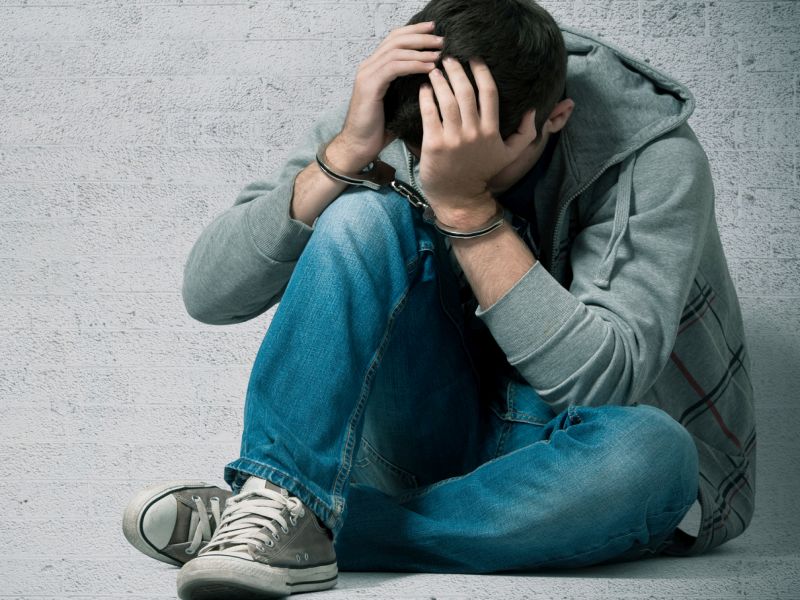Does 'Juvy' Confinement Jeopardize Lengthy-Time period Well being?
 By Amy Norton
By Amy NortonHealthDay Reporter
MONDAY, Jan. 23, 2017 (HealthDay Information) -- Younger individuals in juvenile detention or jail could undergo well being results that final nicely into maturity, a pair of latest research suggests.
Collectively, they counsel incarcerated teenagers will face greater charges of despair, worse bodily well being, and a larger danger of sexually transmitted ailments, in comparison with different younger Individuals.
Consultants mentioned the research spotlight a little-recognized reality: Youth incarceration is a public well being downside.
The US has the very best price of "youth confinement" of any developed nation, in keeping with the advocacy group Marketing campaign for Youth Justice. In 2013, out of each 100,000 minors, 173 have been in confinement nationwide.
"Juvenile incarceration is its personal hidden epidemic," mentioned Ralph DiClemente of Emory College in Atlanta.
DiClemente, a professor of public well being, wrote an editorial accompanying the research, revealed on-line Jan. 23 within the journal Pediatrics.
However till now, DiClemente mentioned, little had been identified concerning the long-term well being of younger individuals who transfer by means of the justice system.
The brand new findings, he mentioned, "present us that these younger individuals have myriad well being issues and danger behaviors, and that continues into maturity."
In a single research, researchers centered on greater than 1,800 younger individuals who had frolicked in Chicago juvenile detention facilities. Fourteen years later, these kids -- now round age 30 -- had a lot higher-than-average odds of dangerous sexual habits, equivalent to having a number of companions inside just a few months.
Within the different research, researchers used information from a authorities survey monitoring the well being of greater than 14,000 Individuals -- beginning in center college or highschool, and persevering with as much as age 34.
Throughout that point, 14 p.c ended up in juvenile detention or jail by age 24.
Total, the research discovered, incarcerated younger individuals confirmed extra well being issues between the ages of 24 and 34, versus different Individuals their age.
Near one-quarter -- 23 p.c -- had despair signs, in contrast with 15 p.c of different research individuals. Greater than 52 p.c rated their basic well being as no higher than "honest," in contrast with 41 p.c.
After all, younger individuals who find yourself in jail have many different issues happening of their lives that might take a toll on their well being, too.
And it is troublesome to weed out the consequences of incarceration itself, mentioned research chief Dr. Elizabeth Barnert.
"It is a mess, and we will not say that that is causal," mentioned Barnert, an assistant professor of pediatrics on the College of California, Los Angeles.
However her workforce did account for plenty of different elements, together with race, earnings and oldsters' schooling ranges.
And incarcerated youngsters nonetheless confirmed greater long-term dangers -- particularly in the event that they'd been confined for a couple of yr.
In keeping with Barnert, younger individuals may very well get sure advantages throughout their time in detention -- specifically, entry to well being care. However, in the long term, she mentioned, incarceration most likely has adverse penalties.
"Is it a direct impact of incarceration? Is it as a result of they can not get a job afterward? Is it the psychological results and the way you view your self afterward?" Barnert mentioned. "We do not know."
What is obvious, she and DiClemente mentioned, is that youngsters and younger adults within the justice system are "weak." And so they return to the group with largely unmet well being care and social wants.
DiClemente mentioned there's a "window of alternative" whereas younger persons are incarcerated, when they are often screened for well being issues and dangerous habits. To an extent, he mentioned, that is taking place: Children could also be screened and handled for a sexually transmitted illness, for instance.
"However what's not accomplished very nicely is risk-behavior discount," DiClemente mentioned. "What occurs after they return to their communities?"
There aren't any simple solutions, he and Barnert mentioned.
In the end, "system-level reform" has to turn into a precedence -- because it has in Georgia, mentioned DiClemente.
The state is implementing the Juvenile Detention Options Initiative, a challenge of the nonprofit Annie E. Casey Basis. It promotes options to locking youngsters up -- equivalent to house confinement, day and night reporting facilities and shelter care.
Round 300 U.S. counties have began this system, in keeping with the Casey Basis. And, the group says, these locations have seen "dramatic" reductions within the variety of youngsters in detention facilities -- with no indicators of harming public security.
"We do not need to relegate these youngsters to a life the place they don't seem to be going to have the ability to attain their full potential," DiClemente mentioned. "This can be a social concern. It is a public well being concern."
Barnert pointed to the well-documented racial disparities in Individuals' well being and involvement with the justice system.
Black males are way more doubtless than whites to be incarcerated sooner or later. And that, Barnert mentioned, could contribute to racial disparities in well being as nicely.

Copyright © 2017 HealthDay. All rights reserved.
SOURCES: Elizabeth Barnert, M.D., M.P.H., assistant professor, pediatrics, College of California, Los Angeles; Ralph DiClemente, Ph.D., professor, public well being, Rollins Faculty of Public Well being, Emory College, Atlanta; Jan. 23, 2017, Pediatrics, on-line
No comments:
Post a Comment